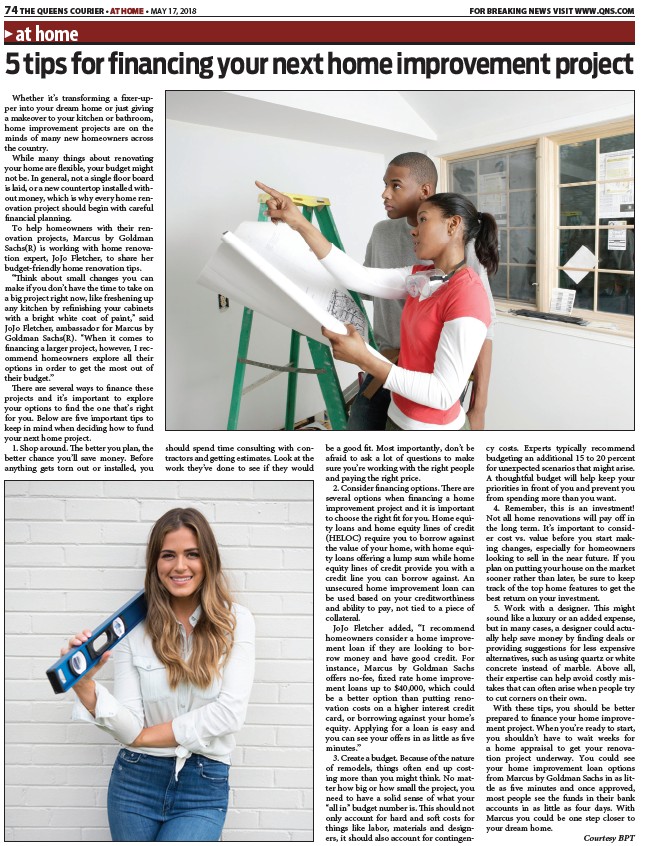
74 THE QUEENS COURIER • AT HOME • MAY 17, 2018 FOR BREAKING NEWS VISIT WWW.QNS.COM
at home
5 tips for fi nancing your next home improvement project
Whether it’s transforming a fi xer-upper
into your dream home or just giving
a makeover to your kitchen or bathroom,
home improvement projects are on the
minds of many new homeowners across
the country.
While many things about renovating
your home are fl exible, your budget might
not be. In general, not a single fl oor board
is laid, or a new countertop installed without
money, which is why every home renovation
project should begin with careful
fi nancial planning.
To help homeowners with their renovation
projects, Marcus by Goldman
Sachs(R) is working with home renovation
expert, JoJo Fletcher, to share her
budget-friendly home renovation tips.
“Th ink about small changes you can
make if you don’t have the time to take on
a big project right now, like freshening up
any kitchen by refi nishing your cabinets
with a bright white coat of paint,” said
JoJo Fletcher, ambassador for Marcus by
Goldman Sachs(R). “When it comes to
fi nancing a larger project, however, I recommend
homeowners explore all their
options in order to get the most out of
their budget.”
Th ere are several ways to fi nance these
projects and it’s important to explore
your options to fi nd the one that’s right
for you. Below are fi ve important tips to
keep in mind when deciding how to fund
your next home project.
1. Shop around. Th e better you plan, the
better chance you’ll save money. Before
anything gets torn out or installed, you
should spend time consulting with contractors
and getting estimates. Look at the
work they’ve done to see if they would
be a good fi t. Most importantly, don’t be
afraid to ask a lot of questions to make
sure you’re working with the right people
and paying the right price.
2. Consider fi nancing options. Th ere are
several options when fi nancing a home
improvement project and it is important
to choose the right fi t for you. Home equity
loans and home equity lines of credit
(HELOC) require you to borrow against
the value of your home, with home equity
loans off ering a lump sum while home
equity lines of credit provide you with a
credit line you can borrow against. An
unsecured home improvement loan can
be used based on your creditworthiness
and ability to pay, not tied to a piece of
collateral.
JoJo Fletcher added, “I recommend
homeowners consider a home improvement
loan if they are looking to borrow
money and have good credit. For
instance, Marcus by Goldman Sachs
off ers no-fee, fi xed rate home improvement
loans up to $40,000, which could
be a better option than putting renovation
costs on a higher interest credit
card, or borrowing against your home’s
equity. Applying for a loan is easy and
you can see your off ers in as little as fi ve
minutes.”
3. Create a budget. Because of the nature
of remodels, things oft en end up costing
more than you might think. No matter
how big or how small the project, you
need to have a solid sense of what your
“all in” budget number is. Th is should not
only account for hard and soft costs for
things like labor, materials and designers,
it should also account for contingency
costs. Experts typically recommend
budgeting an additional 15 to 20 percent
for unexpected scenarios that might arise.
A thoughtful budget will help keep your
priorities in front of you and prevent you
from spending more than you want.
4. Remember, this is an investment!
Not all home renovations will pay off in
the long term. It’s important to consider
cost vs. value before you start making
changes, especially for homeowners
looking to sell in the near future. If you
plan on putting your house on the market
sooner rather than later, be sure to keep
track of the top home features to get the
best return on your investment.
5. Work with a designer. Th is might
sound like a luxury or an added expense,
but in many cases, a designer could actually
help save money by fi nding deals or
providing suggestions for less expensive
alternatives, such as using quartz or white
concrete instead of marble. Above all,
their expertise can help avoid costly mistakes
that can oft en arise when people try
to cut corners on their own.
With these tips, you should be better
prepared to fi nance your home improvement
project. When you’re ready to start,
you shouldn’t have to wait weeks for
a home appraisal to get your renovation
project underway. You could see
your home improvement loan options
from Marcus by Goldman Sachs in as little
as fi ve minutes and once approved,
most people see the funds in their bank
accounts in as little as four days. With
Marcus you could be one step closer to
your dream home.
Courtesy BPT